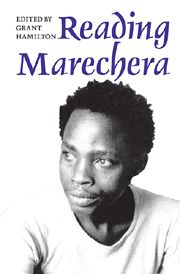Book contents
- Frontmatter
- Contents
- Notes on Contributors
- Introduction
- 1 A Brotherhood of Misfits
- 2 Blowing People's Minds
- 3 Grotesque Intimacies
- 4 Tracing the Stain in Marechera's ‘House of Hunger’
- 5 Menippean Marechera
- 6 Black, But Not Fanon
- 7 The Avant-Garde Power of Black Sunlight
- 8 Classical Allusion in Marechera's Prose Works
- 9 Revisiting ‘The Servants' Ball’
- 10 Marechera, the Tree-Poem-Artifact
- Bibliography
- Index
Introduction
Marechera & the Outside
Published online by Cambridge University Press: 05 April 2013
- Frontmatter
- Contents
- Notes on Contributors
- Introduction
- 1 A Brotherhood of Misfits
- 2 Blowing People's Minds
- 3 Grotesque Intimacies
- 4 Tracing the Stain in Marechera's ‘House of Hunger’
- 5 Menippean Marechera
- 6 Black, But Not Fanon
- 7 The Avant-Garde Power of Black Sunlight
- 8 Classical Allusion in Marechera's Prose Works
- 9 Revisiting ‘The Servants' Ball’
- 10 Marechera, the Tree-Poem-Artifact
- Bibliography
- Index
Summary
In perhaps his most widely read essay, ‘The African Writer's Experience of European Literature,’ Dambudzo Marechera introduces himself as a person who is ‘inclined to disagree with everybody and everything.’ It is at once a light-hearted and deeply provocative self-characterization. Undoubtedly, Marechera did not mind being regarded as the enfant terrible of African literature. Indeed, much of what he said and did painted him in this particular way. His exploits off the page married with the visceral ideas and images that he committed to it, created the myth of the man which would always precede him. So, as he returned to Zimbabwe from his exile in Europe:
Press coverage recounted the highlights of his legendary career: the attempt to set fire to an Oxford college; throwing crockery at the Guardian Fiction Prize ceremony; the ban from his publishers' offices; detention and triumph in West Berlin.
The image of Marechera was of an anarchic young contrarian, a maverick, a rebel who stood against everything simply because he could. And, this is certainly the impression we are left with when we learn that Marechera spoke against Ian Smith's minority regime, declaring himself a supporter of Robert Mugabe, only to then declare his opposition to Mugabe when he later took the reins of government.
- Type
- Chapter
- Information
- Reading Marechera , pp. 1 - 10Publisher: Boydell & BrewerPrint publication year: 2013



